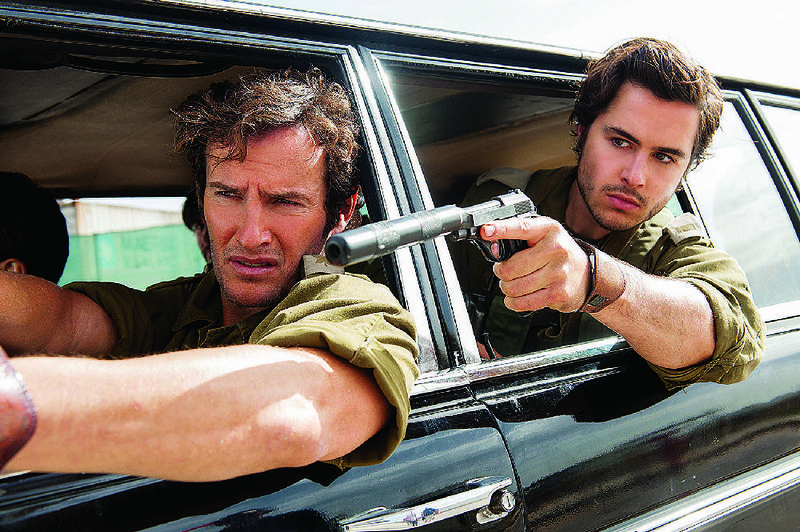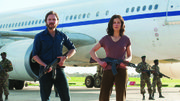A dance piece by Israeli choreographer Ohad Naharin opens 7 Days in Entebbe and resurfaces in rehearsal or performance interludes throughout. Batsheva Dance Company members are arranged on chairs in a semicircle, gradually casting off their Haredi Jewish garments in convulsive movements that suggest a tortured liberation, one not without pain or fear.
Those scenes have an expressive power, an emotional charge and a kinetic energy that's mostly absent elsewhere in Jose Padilha's superfluous retread of the daring 1976 raid by Israeli counterterrorist forces to rescue 102 hostages from a hijacked Air France flight out of Tel Aviv. (Three versions of the hijacking were released in 1977 alone: Raid on Entebbe, Victory at Entebbe and Operation Thunderbolt.)
7 Days in Entebbe
78 Cast: Rosamund Pike, Daniel Bruhl, Eddie Marsan, Lior Ashkenazi, Denis Menochet, Ben Schnetzer, Angel Bonanni, Nonso Anozie, Omar Berdouni, Mark Ivanir, Peter Sullivan, Noof McEwan, Zina Zinchenko
Director: Jose Padilha
Rating: PG-13, for violence, some thematic material, drug use, smoking and brief strong language
Running time: 1 hour, 46 minutes
Unfortunately, the dance elements also feed into some of the clumsy missteps of this lethargic thriller, notably with hackneyed cross-cutting in strategic action scenes, and in a lame romantic subplot between an Israeli special-ops soldier (Ben Schnetzer) and his apprehensive dancer girlfriend (Zina Zinchenko). "I fight so you can dance," he tells her in one of the more regrettable lines of the clunky screenplay by Gregory Burke ('71).
Entebbe is pedestrian in comparison to dramatically complex and dynamically structured terrorism-related dramas such as United 93, Zero Dark Thirty, Steven Spielberg's flawed but ambitious Munich and Ben Affleck's rousingly old-fashioned and entertaining Argo.
Rosamund Pike, doing a lot of crazy-eyed acting in an unfortunate wig (a '70s brunette flip that loses its kick fast), and a bearded Daniel Bruhl, doing not much of anything consistent, play the nominal central characters, Brigitte Kuhlmann and Wilfried Bose. German militants sympathetic to the Palestinian cause, they're central only in the sense that the Palestinian radicals heading the operation alongside them are merely interchangeable faces barking occasional nervous commands.
The film starts promisingly, with bold red graphics identifying the many geographical shifts on day one of the hijacking, later rewinding to the planning stages in Germany and at a Popular Front for the Liberation of Palestine training camp in Yemen. Bose is introduced in a state of sweaty anxiety at Athens airport, where the Paris-bound flight has a refueling stop, while Brigitte is more inscrutable, at least until she starts popping pills on the plane. In part because it's every modern-day air traveler's nightmare, the scenes in which the four hijackers pull out weapons and take control of the flight are genuinely nerve-rattling.
But the tension quickly gets diluted (even the camerawork grows more sluggish) when the action jumps to Jerusalem. Israeli Prime Minister Yitzhak Rabin (Lior Ashkenazi) is notified of the hijacking during a cabinet meeting in which he's shooting down the demands of crafty Defense Minister Shimon Peres (Eddie Marsan) for a significant increase in military spending. Screenwriter Burke reduces these two key political figures to rather simplistic characterizations -- Rabin is all pensive hesitation all the time, while Peres has the smug certainty of a savvy power player.
When the flight arrives via Benghazi in Entebbe, Uganda, with hijackers, crew and passengers given a self-aggrandizing welcome from dictator Idi Amin (Nonso Anozie), the Germans are immediately sidelined. Instructed just to keep the terrified passengers under control in a dilapidated airport building while the Palestinians take charge of negotiations, Bose grows more introspective. As the possibility of having to kill hostages becomes more real, the warnings of Brigitte's boyfriend back home steadily sink in about the horrendous optics of Germans murdering Jews.
Flashbacks reveal Brigitte's motivations in more detail than Bose's, touching on her guilt over the arrest and subsequent death of Ulrike Meinhof and her concern that the movement has lost focus. But these scenes sag under the weight of didactic discussions that never go deep enough to be interesting. Brigitte, when told that the operation is too dangerous for a woman, hits the token feminist button with the staunch response: "I am a revolutionary." But that's nothing compared to her affirmation a little later: "I only fear a life without meaning."
Back in Israel, the friction between Rabin and Peres is driven by their divergent views on what Israel's response should be to the demand for the release of 50 imprisoned pro-Palestinian militants. The Israeli government's policy is never to negotiate with terrorists, and while Rabin agonizes over the potential disaster unfolding, Peres quietly maneuvers to facilitate Operation Thunderbolt, as the covert rescue mission was known.
All this should be the stuff of nail-biting drama, but there's a curious shortage of suspense in the protracted countdown to day seven, along with a lack of impact in the rushed handling of the rescue itself -- all of which is especially disappointing in light of Padilha's sharp execution of the 2002 Brazilian hijacking doc, Bus 174.
Amid the hodgepodge of wandering accents and thin stereotypes, few performances are memorable. Denis Menochet registers effectively in the secondary role of Air France flight-crew engineer Jacques Le Moine, a man whose quiet courage, strength of character and refusal to be intimidated at least makes him someone to root for. Marsan has some fun playing Peres as a calculating, confrontational type, and Ashkenazi gets to foreshadow Rabin's own assassination almost 20 years later with a solemn closing line about the war that will never end. But the concluding screen text about the ongoing deadlock in the Israeli-Palestinian conflict resonates only in the most pro forma way.
Perhaps that's partly because of the movie's failure to figure out exactly what we're supposed to make of the German characters. Are they martyrs, mere pawns used as heavies by the Palestinians and then nudged aside once they had served their purpose? Are they naive believers in one cause, co-opted opportunistically into another? Or are they people of passionate conviction who came to regret their actions?
The case seems strongest for the latter reading, since Bose makes eleventh-hour moves to demonstrate his humanity, while Brigitte pours out her sadness in an excruciatingly awkward monologue that defies description. (Poor Pike is even forced to hack off chunks of that wig in a trite visual metaphor for Brigitte cutting ties.)
But 7 Days in Entebbe ultimately feels wishy-washy because it never fully commits to anyone's perspective -- not that of the Israelis and certainly not the Palestinians, nor the Germans or the 12 French crew members who insisted on remaining with the hostages even after the majority of non-Israeli passengers had been released. It should be a pulse-racing account of knife-edge real-life conflict and valiant heroics, full of needling political questions. Instead it's merely another slack thriller with underdeveloped characters and sputtering dramatic momentum.
MovieStyle on 03/16/2018


